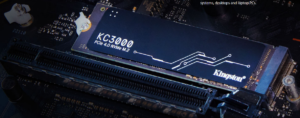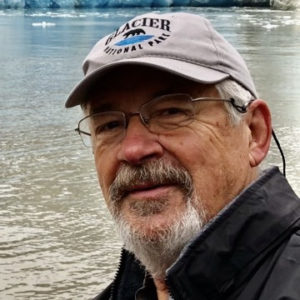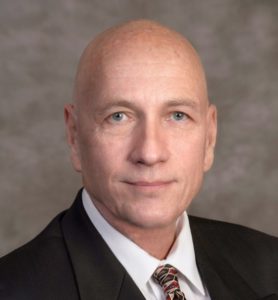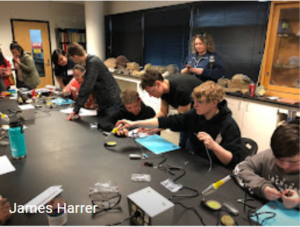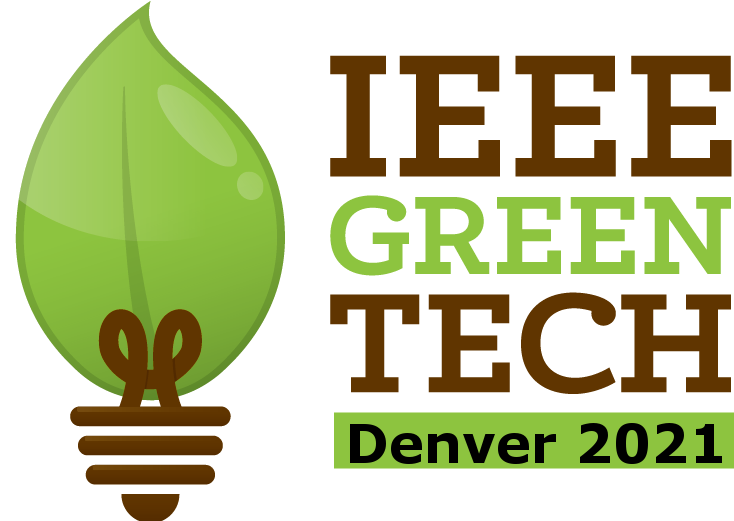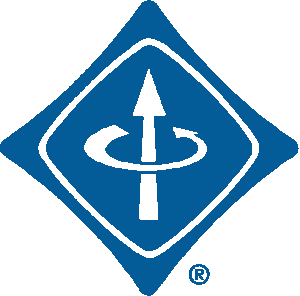 |
|
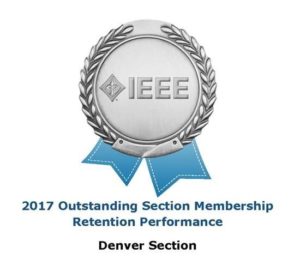 |
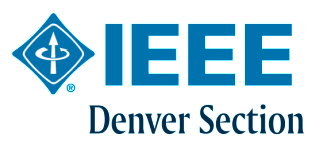
May/June 2021 Volume 12 Issue 3
|
GET INVOLVED!!
Whether you are active in IEEE ExCom, are a chair of a
 technical society, or just a paying member, we thank you for being a part of something that we think is pretty great. If you want to get more involved, you know where to find us! And if you just want to enjoy the hard (and not-so-hard) work of our volunteers by attending our events we would love that even more! Take advantage of the monthly volunteering efforts we have put together for you. Try something new, meet some new people, and learn something new by listening to a distinguished lecturer. Oh, and thank you for being a reader of our newsletter! technical society, or just a paying member, we thank you for being a part of something that we think is pretty great. If you want to get more involved, you know where to find us! And if you just want to enjoy the hard (and not-so-hard) work of our volunteers by attending our events we would love that even more! Take advantage of the monthly volunteering efforts we have put together for you. Try something new, meet some new people, and learn something new by listening to a distinguished lecturer. Oh, and thank you for being a reader of our newsletter! |
|
Local Events News Interesting Links
|
Follow IEEE-Denver on Social Media! |
| AGL eDigest Newsletter – Current Happenings in the Wireless Space | 6G world – A Look Into the Next Generation of Wireless |
Hot Topics
| On the Edge – A New Space Race Has Begun | Insight – The Road to 5G – Visions and Challenges |
| Guest Column – Will Autonomous Vehicles Really Live Up to the Hype? | Tech Talk – What is a Hall-effect sensor? |
| Technical Articles and While Papers |
| Statistical In-Depth Security Analysis for Vehicle to Everything Communication Over 5G Networks. By Rejwan Bin Sulaiman and Ranjana Lakshmi Patel |
| What Is Behind the Drive Towards Terahertz Technology Of 6G. By By Jonathan Borrill. |
| Taking Charge of Electric Vehicles – Both in the Vehicle and on The Grid. By Xun Gong and Jayanth Rangaraju |
| High-Current Designs Utilizing Paralleled Mosfets in Motor Drive Applications. By Medic Urban and Kahrimanovic Elvir |
| Enabling Smart Robotics with Single-Board Computing – Advantech |
| Iot Vulnerabilities and the IoT Security Crisis – kajeet |
| Design For Manufacturing for HDI Printed Circuit Boards – Tempo Automation |
| An Analysis of Cybersecurity Attacks Against Internet of Things and Security Solutions. By Mohammad Rafsun Islam, K. M. Aktheruzzaman |
| Build An Edge to Cloud AI Infrastructure – Intel |
| Three Best Practices for Optimizing EVM Measurements of Wideband Signals – Keysight |
Follow IEEE-Denver on Social Media!Follow along with the local events and happenings of your IEEE Denver section by subscribing on social media. And don't forget to "like" and share your favorite posts!
-Facebook Page- –LinkedIn Group- –LinkedIn Page-
|
|
Message from Jim Sipes, Chair, IEEE Denver Section, Jim Sipes – jsipes@ieee.org
Happy Holidays! What a year it has been! I’m sure many of us expected that by now the pandemic would be behind us and life would be returning to normal. I certainly did. But we’ve been able to continue with most of our activities, even if in a somewhat modified, and frequently somewhat less satisfying, form. The year began with the announcement of the 2021 class of IEEE Fellows, and the list included two members of the Denver section – Prof. Michael Wakin, professor of EE, Colorado School of Mines, and Prof. David Wenzhong Gao, professor of EE, University of Denver. Congratulations to them both. In the spring, the Denver section hosted the 13th IEEE Green Technologies Conference, and the Annual Region 5 Conference and Student Competitions. Pivoting from in-person meetings to an all-virtual format was what one might call exciting, but the team pulled it off quite well. The GreenTech conference was very well attended, with papers submitted and attendees joining from quite literally all over the globe. Thanks go to the organizing committee team led by the General Chair, Abd Arkadan, and consisting of Marcelo Simoes as Technical Programs Chair, Ahmed Mohamed as Publications Chair, Ian MacMillan as Operations Chair, David Wenzhong Gao as Tracks, Workshops and Special Sessions Chair, Bri-Mathias Hodges as Industrial Program Chair, Charles Okaeme as Exhibitors Chair, and Alisha Humphries as Conference Treasurer. Mike Mattice and Jim Harrer did a great job of structuring a (virtual) robotics competition, as did Neill Kefauver with the (virtual) poster competition, Steve Watkins with the (virtual) student ethicseCompetition, and Christopher Coulston with the (virtual) circuit design competition. Throughout the year we have had a total of 29 elevations of membership to senior member or life-senior member within the section, representing approximately 1% of the total section membership. Congratulations to all who have achieved this recognition. The elevation in grade to senior member is done in recognition of a member’s accomplishments over a period of at least ten years, with some credit being provided for education. For those not familiar with process, the upgrade can either be self-nominated, or the nomination can be made by a society or a section. If self-nominated, references to support the nomination are needed by three current senior members; if nominated by a Society or the Section, only two additional references are needed. The section maintains a list of senior members who have volunteered to “give back” by serving as references for other members seeking the upgrade. So, if you feel ready to apply for senior member upgrade but are concerned about having the needed references, just let me know. I can serve as your nominator for the section and provide names as references. Or if you are already a senior member and would like to volunteer to be a reference for others, please let me know. As always, we continue to have many opportunities to contribute as a volunteer to the section or to your chapter/group of choice, and all are welcome at the monthly ExCom meetings on the third Tuesday of the month (except December and July). I expect that these meetings will remain in virtual format at least until the current omicron Covid variant is better understood. There is a listing of the current chapters and groups supported by the Denver section on the section’s website, https://ieee-denver.org, under the menu heading Denver groups. Contacts for each of the chapters/groups are available on the individual chapter/group websites. That’s all for now, so until next time, stay safe. Best wishes to you and your family and have a happy holiday season. Jim From the Editor’s Desk, Ernest Worthman – ernest_worthman@ieee.org 6G in 2024? – Ha!It was during my usual morning routine as I was scrolling my feeds and emails when I came across this. I must say it was the best morning laugh I have had in a long time. In what universe (to paraphrase Sheldon Cooper from “Big Bang Theory” fame) is that going to happen? Well, it seems everybody is jumping on the 6G bandwagon of late. India has had nothing but struggles to get 5G going. There have been reports after reports about how India is struggling with spectrum, regulations, infrastructure, and they want us to believe they can have 6G running by the end of 2023. Heck, they will not even auction off any advanced 5G spectrum until 2022 according to India’s Minister for Communication Ashwini Vaishnaw. Nor do they have a native 5G software for their core yet. When it comes to spectrum, India is getting ready to auction off spectrum in bands starting as low as 700 MHz to 3,600 MHz bands. There is also mmWave spectrum in that pile. Not that India does not have a wealth of intellectual capability. I see and publish bleeding-edge papers from them all of the time. So, it is not at all difficult to believe India can develop B5G technologies. However, understand that B5G is a wish list today. While there is certainly research and studies going on and, theses and antitheses’ being published, it is years away from any kind of congealed mass, or from, or platform, or technology, or whatever tangible something we can work with. It also depends upon where we want to draw the B5G line. If we set a low bar for it, sure, maybe in a few years we will see some hardware that can up the ante for radiating elements. However, one must also remember that there is a wide gray area where 5G and B5G will coexist for years. In fact, I believe there will never be a distinct delimiter between the two. B5G will simply be the advancement of 5G until we find a different way to transmission information beyond wireless – and who knows when or even if that will ever occur. But there are some really interesting reads about this. The news came from Vaishnaw who claims development work on B5G (as I like to call it) has already started. So, India now just joins a group of countries that are dipping their toes in the B5G waters. That is not news. But to claim that working 6G will be seen in the next year to 18 months is, to me, pure hype, not even wishful thinking. Especially since the majority of other governments and private research is shooting for 2028 at the earliest. And that will likely be the evolution of advanced platforms in B5G by the inclusion of elements such as AI, XR (eXtended reality), Internet of Anything/Everything (IoX), autonomous vehicles, intelligent machines, and more. Is it reasonable to expect to see the inklings of B5G by the end of the decade? I am confident that this is a reasonable timetablre. But what we will see will only be a peak at 6G and more likely the maturation of 5G as it scales and evolves. True revolutionary wireless networks will likely be closer to 2035. That is not to say that we will not see some amazing advancements in what wireless can accomplish (holographs for example). But these are being touted as being part of 5G as well, as are the other above-mentioned platforms/technologies. Right now, just about anything goes with xG. There are no hard and fast lines in the sand where 5G ends and B5G begins. As I said earlier, there may never be. 5G will continue to evolve for at least a decade or two. Whether, at some point, we decide to call it something other than B5G is probably in the hands of the marketers and hypsters. IEEE Distinguished Lecturer Presentation How Robotics are Revolutionizing Rehabilitation. by Hermano Igo Krebs Virtual Presentation on January 5th, 2022, 12-1 PM MST (United States) Register here: https://events.vtools.ieee.org/tego_/event/manage/293756
MIT’s motto is “Mens et Manus” (Mind and Hand), and Dr. Krebs and his MIT 77Lab have taken this as a guiding rule for a new line of robotics research: using robotics and information technology to reconnect the brain to the hand. This Presentation describes how he and his Lab have developed a gym of applications to help heal stroke patients and others with nerve injuries. “We pioneered the field of rehabilitation robotics starting with the development of the MIT-Manus in 1989 and developed multiple robotic tools: the MIT-Manus, wrist, hand, anti-gravity, pelvis, anklebot, pediatric anklebot, and MIT-skywalker. These robots have provided most of the clinical data supporting the use of robotics to the upper extremity (American Heart Association, Veterans Administration, Dep of Defense Guidelines for Stroke Care).” Abstract How Robotics are Revolutionizing Rehabilitation January 5th, 2022, 12-1 PM MST (United States) Abstract: Capitalizing on the new understanding of brain plasticity, we introduced a paradigm shift in clinical practice in 1989 when we initiated the development of the MIT-Manus robot for neuro-rehabilitation and deployed it into the clinic. Since then, we collected evidence to support the potential of enhancing and augmenting recovery following a stroke, first during the sub-acute and then the chronic phase. Our efforts and that of others led to the endorsements starting in 2010 from the American Heart Association, the American Stroke Association, and the Veterans Administration for the use of rehabilitation robots for the Upper Extremity, but not yet for the Lower Extremity. AHA recommendations were the same in the 2016 revision. Furthermore, it was demonstrated in the VA system that upper extremity robotic therapy has an economic advantage over manual therapy. More recently we completed a pragmatic study RATULS under the auspices of the National Health Service of the United Kingdom and its NIHR Health Technology Assessment Programme, which enrolled 770 stroke patients. Thus, we have developed novel robotic treatment and evaluation tools and have managed to collect the experimental evidence that demonstrates the unequivocal therapeutic benefits stemming from robot-aided rehabilitation for the upper extremity as well as present shortcomings. This talk will present an overview of our past rehabilitation robotics efforts and more recent efforts addressing the identified shortcomings.
Dr. Hermano Igo Krebs is a Principal Research Scientist and Lecturer at MIT’s Mechanical Engineering Department and the Director of The77Lab (https://the77lab.mit.edu/). He holds an affiliate position as an Adjunct Professor at University of Maryland School of Medicine, Department of Neurology, and as a Visiting Professor at Fujita Health University, Department of Physical Medicine and Rehabilitation (Japan), at Osaka University, Mechanical Science and Bioengineering Department (Japan), and at Loughborough University, Rehabilitation Robotics of The Wolfson School of Mechanical, Electrical, and Manufacturing Engineering (UK). He is a Fellow of the IEEE and was nominated to this distinguished engineering status “for contributions to rehabilitation robotics and the understanding of neuro-rehabilitation.” He received “The 2009 Isabelle and Leonard H. Goldenson Technology and Rehabilitation Award,” from the Cerebral Palsy International Research Foundation (CPIRF), the 2015 IEEE-INABA Technical Award for Innovation leading to Production “for contributions to medical technology innovation and translation into commercial applications for Rehabilitation Robotics,” and he was selected as a 2021 IEEE-EMBS Distinguished Lecturer (2021/2022). He was one of the founders, member of the Board of Directors, and the Chairman of the Board of Directors of Interactive Motion Technologies from 1998 to 2016. He successfully sold it to Bionik Laboratories, a publicly traded company, where he served as its Chief Science Officer and as a member of the Board of Directors until July 2017. He later founded 4Motion Robotics. See: https://the77lab.mit.edu/ A gym of robots. (a) The shoulder-and-elbow MIT- MANUS delivering therapy to a child with CP (Spaulding Rehabilitation Hospital). (b) The antigravity module (Baltimore VAMC). (c) A person with PD and deep brain stimulation (DBS) practicing with the wrist robot (University of California San Diego). (d) The integrated system affording whole-arm training (transport of the arm and manipulation of objects, VA Coop Study Randomized Clinical Trial CSP 558). (e) The hand module (without cover). (f) A person with MS during therapy with the anklebot (West Haven VA Medical Center). Register here: https://events.vtools.ieee.org/tego_/event/manage/293756 The Build Something Cool (BSC) Event
The Build Something Cool (BSC) Event at the Downtown Auraria Campus in Denver is now in planning for 2022! Survey: https://msudenver.qualtrics.com/jfe/form/SV_b8G8Blb0ICfjX2m Many IEEE Members remember the Build Something Cool Event and have volunteered for this STEM project for kids in 6th to 12th grade in the Colorado area. IEEE engineers and friends help the participants learn to assemble, solder and troubleshoot their own DIY project to keep and take home. The February 29, 2020, BSC Event attracted over 100 participants and 34 volunteers. Usually held in February of each year, it was cancelled for 2021 because of Covid-19. We would like your feedback on when to hold the BSC for this coming year, 2022. Please take a moment to send us your opinion. A survey can be accessed via the link below. Dates are suggested in February and March, but feel free to enter other Saturday dates as well. https://msudenver.qualtrics.com/jfe/form/SV_b8G8Blb0ICfjX2m Thank You from the BSC Planning Team Hsiu-Ping Liu, Walt Burns, Wayne Seltzer, Jim Harrer CALL FOR PARTICIPATIONIEEE Vehicular Technology Society/ Intelligent Transportation Systems Standards Committee Motor Vehicle Event Data Recorder Study Group IEEE Standards Association (IEEE SA) invites you to participate in the Motor Vehicle Event Data Recorder Study Group (MVEDR SG), which is under the IEEE Vehicular Technology Society/ Intelligent Transportation Systems Standards Committee (VTS/ITS). WHY GET INVOLVED As a follow-up to the recent revision of IEEE Std 1616-2021: IEEE Standard for Motor Vehicle Event Data Recorder (MVEDR), IEEE VTS/ ITS is soliciting participants to the IEEE Motor Vehicle Event Data Recorder Study Group to discuss future Motor Vehicle Event Data Recorder topics, involve experts in the field, disseminate work in progress, and promote new ideas. MEETING INFORMATION Date: Wednesday, 15 December 2021 The Study Group will meet the third Wednesday of each month through 20 April 2022. Study Group meetings are open to all interested parties. The overall goal is to determine next steps and prioritize criteria toward MVEDR standardization for automated vehicles. For additional information, contact the IEEE VTS/ITS Standards Committee MVEDR Study Group Chair, Thomas M. Kowalick, at mvedr@ieee.org or the IEEE SA Program Manager, Soo Kim, at s.h.kim@ieee.org. Conferences/Summits/Call for Papers/Workshops/Tutorials IEEE Consumer Communications and Networking Conference The 2022 IEEE Consumer Communications and Networking Conference (CCNC) will be held from 8-11 January 2022 in Las Vegas, Nevada. We are accepting paper submissions on the following topics:
24th International Microwave and Radar Conference – MIKON-2022 We would like to invite you to the 24th International Microwave and Radar Conference – MIKON-2022 at the Radisson Hotel & Suites in Gdansk, POLAND. It is exciting to have our conference in Gdansk, and we hope to repeat the success of MIKON-2014, which was also held here. Conference date: 9-11 May 2022 Again, MIKON is a part of Microwave and Radar Week (MRW), together with International Radar Symposium IRS. MIKON takes place from Monday to Wednesday (9-11 May), while the Week extends also to Thursday (12 May) with tutorials and other activities. Registration at MIKON gives you the opportunity to participate in both conferences within MRW2022. The conference is co-sponsored by the Institute of Electrical and Electronics Engineers (IEEE), European Microwave Association (EuMA), and GAAS Association. It is intended to provide an international forum for the exchange of information on state-of-the-art research in antennas, propagation, electromagnetic engineering, radars, sensors, and radio science. Contributed papers are solicited for the following topics: Topics of interest include, but not limited to:
You are kindly invited to submit an interesting paper. The submission site (https://www.edas.info/N28978) is open until 14th January 2022. The submission site is hosted by EDAS (https://www.edas.info). After acceptance of the submitted abstract, you will be asked to prepare a full paper, with a deadline of 1 Apr 2022. The accepted conference proceedings will be published in IEEE Xplore, and extended versions of selected papers will be submitted to special issues of IEEE Transactions on MTT and MDPI Sensors. Before registering a paper, please read the submission instructions (https://mrw2022.org/instructions-for-authors). Please consider also proposing a focused session. Please visit the MRW-2022 website (https://mrw2022.org) for more information on MIKON and the exhibition. Please direct questions to Rafal Lech (Org. Comm. Co-Chair), dr.rafal.lech@ieee.org With best regards, 2022 IEEE International Conference on Communications (ICC 2022) (ICC 2022) will be held in Seoul, South Korea, from 16 to 20 May 2022. Themed “Intelligent Connectivity for Smart World,” this IEEE Communications Society flagship conference will feature a comprehensive high-quality technical program in addition to an attractive industry program aimed at practitioners, with keynotes and panels from prominent research, industry and government leaders; business and industry panels; and technological exhibits. We are currently accepting papers for the following workshop: WS-1: Special Workshop on Reconfigurable Intelligent Surfaces WS-2: Special Workshop on 6G: Current Research Trends and Open Challenges WS-3: Workshop on Research Advancements in Future Networking Technologies WS-4: Workshop on Integrating UAVs into 5G and Beyond WS-6: Workshop on Rate-Splitting Multiple Access for 6G WS-7: 4th Workshop on Integrated Sensing and Communication (ISAC) WS-8: Workshop on Synergies of Communication, Localization, and Sensing towards 6G WS-9: Workshop on Orbital Angular Momentum Transmission WS-11: Workshop on Semantic Communications WS-12: Workshop on Industrial Private 5G-and-beyond Wireless Networks WS-13: Workshop on Edge Learning for 5G Mobile Networks and Beyond WS-14: Workshop on Terahertz Communications WS-15: Workshop on Short Packet Communications for 6G Mission-Critical Applications WS-16: Workshop on Optical Wireless Communications (OWC’22) WS-17: Workshop on Edge Artificial Intelligence for 6G WS-18: Workshop on Satellite Mega-Constellations in the 6G Era (6GSatComNet’22) WS-19: Workshop on E-health Security for Future 6G WS-20: Workshop on Intelligent and Cloud-based RAN WS-22: Workshop on Data Driven Intelligence for Networks and Systems (DDINS) WS-23: Workshop on Spectrum Sharing Technology for Next Generation Communications WS-24: Workshop on Wireless Propagation Channels for 5G and B5G All workshop papers should be submitted via EDAS. Important Deadlines Paper Submission Deadline: 20 January 2022 Acceptance Notification: 06 March 2022 Camera-ready Submission: 15 March 2022 IEEE International Symposium on Local and Metropolitan Area Networks IEEE LANMAN 2022, a forum for presenting and discussing the latest technical advances in local and metropolitan area networking, will be held from July 11 to 12, 2022. Speculative and potentially transformative ideas are particularly encouraged, as are studies reporting measurements from real-life networks and testbeds. Papers are solicited on any topic in networking, including, but not limited to:
Submissions are due March 31, 2022. EMC+SIPI Call for Submissions for the 2022 IEEE International Symposium on Electromagnetic Compatibility, The 2022 IEEE International Symposium on Electromagnetic Compatibility, Signal & Integrity (EMC+SIPI) is seeking submissions! The 2022 symposium will be held 1-5 August 2022 in Spokane, Washington. In addition to the many technologies this conference covers that may be of interest to you, you are also eligible to receive the discounted IEEE Electromagnetic Compatibility Society (EMC) Member rate to attend since you are a member of an EMC Sister Society. Join your colleagues IN PERSON and share your insight, ask questions, learn from the experts/innovators, and see new products at the 2022 IEEE International Symposium on Electromagnetic Compatibility, Signal & Power Integrity. Your published paper will be seen by thousands in the EMC community and across the wide array of disciplines that look to the IEEE EMC Society for technical guidance. In addition, it will be uploaded to IEEE Xplore® with the exposure and recognition that brings. Symposium Topics The technical program committee has proposed Special Topic Areas:
If you have expertise in these areas, please contribute to the technical program! Learn more about all possible topics of interest and technical areas here. Call for Submissions In addition to Traditional Papers, the Symposium also invites authors to participate through other formats. Authors who wish to present their work without the burden of writing a full manuscript may submit an extended abstract (Abstract-Reviewed Paper). For authors wishing to informally present their work in the interactive environment of a Poster Paper, this option is also available. If there is a special area that warrants a dedicated session with papers from a variety of excellent authors, organizers should work with one of the Technical Committees to propose a Special Session. Workshops and Tutorials offer another way to cover a topic area. Organizers invite presentations from several speakers. These PowerPoint presentations are submitted instead of abstract-reviewed or traditional papers and are included in the symposium proceedings. Contributors who prefer to present their work as a live experiment or demonstration can submit a proposal for Experiments & Demonstrations. Papers, proposals for special sessions, workshops, tutorials, experiments and demonstrations can be submitted using our portal: www.emc-sipi2022.abstractcentral.com Technical Exhibition Interested in exhibiting? The EMC+SIPI Symposium has a significant, interactive technical exhibition with many companies providing software and hardware demonstrations. There are also “Recruiting” opportunities to reach this targeted market if your company is hiring. Contact emci@heiexpo.com for more information. Key Dates
Signal & Integrity is Now Open! Receive a discounted rate to attend as an EMC Sister Society member. Call for Nominations: 2023 IEEE MGA Leadership Positions: Deadline 15 March The IEEE Member and Geographic Activities (MGA) Nominations and Appointments (N&A) Committee is soliciting nominations for the following 2023 leadership positions: – MGA Vice President-Elect/Board Chair-Elect – MGA Treasurer -MGA Vice Chairs -Geographic Unit Operations -Information Management -Member Development – Committee Chairs -Admission and Advancement (IEEE) -Awards and Recognition -IEEE.tv Advisory -Life Members (IEEE) -Member Benefits Portfolio Advisory -Membership Recruitment and Recovery -Potentials Editorial Board -Student Activities -Training -vTools -Young Professionals (IEEE) Th deadline to submit nominations for the above positions is 15 March 2022. A complete list of available MGA positions, committee descriptions, and information on the MGA Nominations and Appointments process are available. Nominate yourself or a colleague now IEEE Vehicular Technology Magazine Special Issue Call for Papers Special Issue on Recent Advances in Automated Driving Technologies
We live in the era of the advent of automated vehicles. These machines will bring dramatic changes to both the automotive industry and everyday life, revolutionizing the concept of passenger mobility. Perception is crucial for an autonomous vehicle, and presents important challenges, many of which are still to be addressed. The choice of sensors is pivotal, yet there is still no general consensus on what the “best” sensory equipment should consist of. Perception-related information is then used to make timely decisions on path planning and vehicle dynamics control, to ensure efficient and safe vehicle behavior. In this context, the importance of the role of machine learning algorithms is increasing quickly, in the generation of trajectories perceivable as “natural” by the car occupants for example, or in object recognition. This Special Issue encourages researchers working in this field to share their latest developments on sensing and perception, path planning and decision making, machine learning and control using data-driven learning or physics-driven algorithms, focusing on technologies directly applicable to autonomous vehicles. The topics of interest include, but are not limited to:
Submitted papers should contain state-of-the-art research material presented in a tutorial or survey style. All manuscripts should contain state-of-the-art material presented in a tutorial or survey style, and must adhere to IEEE VTM guidelines. Submit PDF version of complete manuscripts to https://mc.manuscriptcentral.com/vtm-ieee Guest EditorsBasilio Lenzo Ricardo de Castro Yan Chen Shaobing Xu Dongpu Cao Xudong Zhang Stay tuned for GreenTech 2022 information coming soon You can see all of our upcoming events on the IEEE Denver Events Calendar The IEEE Denver Section is comprised of over 3600 engineers and technical professionals in the Denver – Boulder area. Mission Statement Enrich the professional and personal lives of the Rocky Mountain Region members, developing them into valued contributors to society through quality programs, continuing education, career development and community service; in collaboration with IEEE, industry, government and academia.
|
||||||||||||||
|
|
|||||||||||||||



